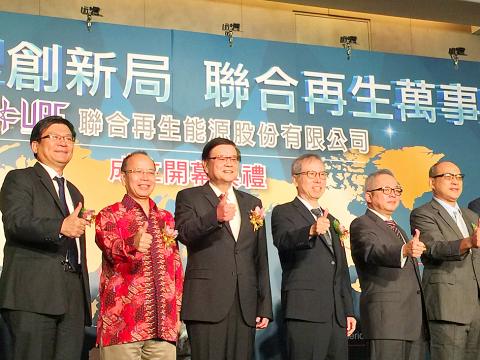The government needs to create a local carbon trading market to encourage the private sector to invest in ground-mount solar arrays and help accelerate the nation’s shift to greener energy consumption, the newly formed United Renewable Energy Co (URE, 聯合再生能源) said yesterday.
URE was created through a merger of three solar cell manufactures — Neo Solar Power Corp (新日光能源), Gintech Energy Corp (昱晶能源) and Solartech Energy Corp (昇陽光電). Neo Solar, the surviving entity, is to be officially renamed URE next month.
The government has set a goal to complete the deployment of solar panels with an installed capacity of 20 gigawatts by 2025, part of its efforts to make the nation a nuclear-free country.

Photo: Chang Hui-wen, Taipei Times
Its goals include having renewable energy make up 20 percent of total power generation within the next seven years, and it is pushing for the installation of large-scale ground-mount solar arrays, while a solar subsidy program is now in its second stage. It also plans to subsidize 17 gigawatt solar panels by 2025.
“Building a carbon trading exchange is crucial to stimulate interest in investing in ground-mount solar panels, as operators can make better returns on selling carbon credits and recover investments faster,” URE chairman Sam Hong (洪傳獻) said during a ceremony in Taipei to mark the company’s establishment.
Traditionally, operators make money by selling electricity generated by solar panels to state-owned Taiwan Power Co (台電), based on the fixed feed-in tariffs set by the government, Hong said.
Without an official carbon trading mechanism, companies with environmental obligations currently trade carbon credits, or green certificates, privately, he said.
“Such a trading pattern is not healthy as the certificates or credits could be traded at unfair prices. It also lacks transparency,” Hong said.
Building ground-mount solar arrays is much more complicated and expensive, as a sizable amount of land must be acquired and an electrical wiring network established, he said.
URE aims to become a company that offers total solutions for the solar cell industry, and has set a revenue goal of NT$40 billion (US$1.3 billion) for next year.
It estimates that its revenue could more than double within five years to NT$90 billion.
The new firm’s workforce is about 5,000 smaller than the total of the three firms after 25 to 30 percent of their employees quit following the merger, URE said.
Shares of Neo Solar yesterday tumbled 2.57 percent to NT$9.47 in Taipei trading.

BYPASSING CHINA TARIFFS: In the first five months of this year, Foxconn sent US$4.4bn of iPhones to the US from India, compared with US$3.7bn in the whole of last year Nearly all the iPhones exported by Foxconn Technology Group (富士康科技集團) from India went to the US between March and last month, customs data showed, far above last year’s average of 50 percent and a clear sign of Apple Inc’s efforts to bypass high US tariffs imposed on China. The numbers, being reported by Reuters for the first time, show that Apple has realigned its India exports to almost exclusively serve the US market, when previously the devices were more widely distributed to nations including the Netherlands and the Czech Republic. During March to last month, Foxconn, known as Hon Hai Precision Industry

Taiwan Semiconductor Manufacturing Co (TSMC, 台積電) and the University of Tokyo (UTokyo) yesterday announced the launch of the TSMC-UTokyo Lab to promote advanced semiconductor research, education and talent development. The lab is TSMC’s first laboratory collaboration with a university outside Taiwan, the company said in a statement. The lab would leverage “the extensive knowledge, experience, and creativity” of both institutions, the company said. It is located in the Asano Section of UTokyo’s Hongo, Tokyo, campus and would be managed by UTokyo faculty, guided by directors from UTokyo and TSMC, the company said. TSMC began working with UTokyo in 2019, resulting in 21 research projects,

Ashton Hall’s morning routine involves dunking his head in iced Saratoga Spring Water. For the company that sells the bottled water — Hall’s brand of choice for drinking, brushing his teeth and submerging himself — that is fantastic news. “We’re so thankful to this incredible fitness influencer called Ashton Hall,” Saratoga owner Primo Brands Corp’s CEO Robbert Rietbroek said on an earnings call after Hall’s morning routine video went viral. “He really helped put our brand on the map.” Primo Brands, which was not affiliated with Hall when he made his video, is among the increasing number of companies benefiting from influencer

Quanta Computer Inc (廣達) chairman Barry Lam (林百里) yesterday expressed a downbeat view about the prospects of humanoid robots, given high manufacturing costs and a lack of target customers. Despite rising demand and high expectations for humanoid robots, high research-and-development costs and uncertain profitability remain major concerns, Lam told reporters following the company’s annual shareholders’ meeting in Taoyuan. “Since it seems a bit unworthy to use such high-cost robots to do household chores, I believe robots designed for specific purposes would be more valuable and present a better business opportunity,” Lam said Instead of investing in humanoid robots, Quanta has opted to invest